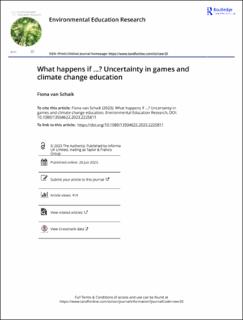| dc.contributor.author | van Schaik, Fiona | |
| dc.date.accessioned | 2023-09-14T13:24:32Z | |
| dc.date.available | 2023-09-14T13:24:32Z | |
| dc.date.created | 2023-07-03T12:27:02Z | |
| dc.date.issued | 2023 | |
| dc.identifier.citation | van Schaik, F. (2023) What happens if …? Uncertainty in games and climate change education. Environmental Education Research | en_US |
| dc.identifier.issn | 1350-4622 | |
| dc.identifier.uri | https://hdl.handle.net/11250/3089530 | |
| dc.description.abstract | Uncertainty complicates the issue of climate change. Climate change education should therefore help students to address uncertainty. The question, then, is how to educate students about that which is ‘in the dark’. Here, we might find a role for games as a resource for climate change education. This study explores which climate change-related uncertainties were represented in three games. A qualitative content analysis was conducted using a framework that distinguishes between different types of uncertainty. Most uncertainties in the games concerned questions such as, ‘What will happen?’ and ‘What should I do?’ Five main topics of uncertainty were represented in the games: (a) climate change measures, action and cooperation; (b) climate change consequences; (c) resource availability and management, and survival; (d) events; and (e) perspectives on the climate crisis, on measures and on the treatment of others. The games approached these uncertainties differently. The study forms a starting point for research on the potential of games for addressing climate change-related uncertainty in education. | en_US |
| dc.language.iso | eng | en_US |
| dc.publisher | Informa UK Limited, trading as Taylor & Francis Group | en_US |
| dc.rights | Navngivelse 4.0 Internasjonal | * |
| dc.rights.uri | http://creativecommons.org/licenses/by/4.0/deed.no | * |
| dc.subject | utdanningsvitenskap | en_US |
| dc.subject | klimaendringer | en_US |
| dc.title | What happens if …? Uncertainty in games and climate change education | en_US |
| dc.type | Peer reviewed | en_US |
| dc.type | Journal article | en_US |
| dc.description.version | publishedVersion | en_US |
| dc.rights.holder | © 2023 The Author(s). | en_US |
| dc.subject.nsi | VDP::Samfunnsvitenskap: 200::Pedagogiske fag: 280 | en_US |
| dc.source.journal | Environmental Education Research | en_US |
| dc.identifier.doi | 10.1080/13504622.2023.2225811 | |
| dc.identifier.cristin | 2160321 | |
| cristin.ispublished | true | |
| cristin.fulltext | original | |
| cristin.qualitycode | 2 | |

